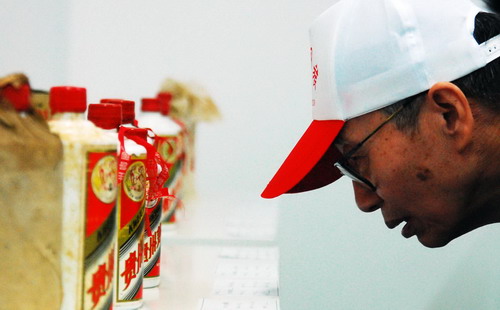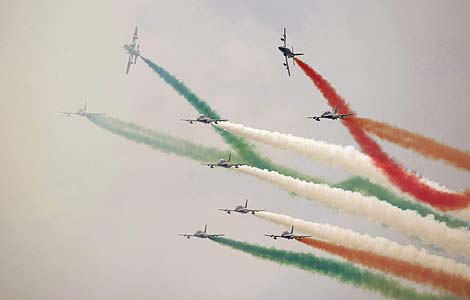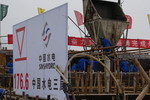Liquor makers ordered to stabilize prices
Updated: 2011-09-28 10:28
By Tang Zhihao (China Daily)
|
|||||||||||
|
 A man looks at Moutai, the most popular Chinese white liquor in a bidding block in Nanchang, Jiangxi province. The Chinese government has moved to rein in producers of Chinese white liquor. [Photo/China Daily] |
SHANGHAI - After years of price surges, the government has moved to rein in producers of Chinese white liquor, known as baijiu.
A posting on the website of the China Alcoholic Drinks Industry Association (CADIA) said that the National Development and Reform Commission (NDRC) has told several makers of white spirits to stabilize their prices.
It's the second time this year that the industry has had talks with the NDRC. The first meeting, held this spring, covered not only Chinese white liquor, but also some other alcoholic beverages.
The focus of the second round of talks, however, indicated that the authorities have lost patience with the inflated price of high-end white spirits such as Moutai and Wuliangye, the most popular drinks at social gatherings and formal banquets.
Many connoisseurs have been surprised by the increase in the price of some brands of Chinese liquor over recent years. For example, a bottle of Feitian Moutai made by Kweichow Moutai Co Ltd is currently priced at around 1,800 yuan ($280), an increase of about 50 percent from the 2009 price of less than 1,000 yuan.
The price increases have elevated Chinese white spirits to collector status. Some financial institutions have even established trust funds to invest specifically in Chinese white liquor. The investment return is projected to be higher than those for deposits in banks.
"Although baijiu is not an necessity of daily life, it can play an important role in stabilizing prices. Spirits makers are required to maintain the price at a reasonable level and are advised not to increase factory prices in the immediate future," according to a statement prepared by CADIA on Sept 19.
Chinese liquor prices have increased dramatically from late 2009, after the central authorities announced plans to levy a spirit consumption tax based on the retail, rather than factory, price. However, industry experts said the producers have simply transferred the tax burden to the customer.
Though the price watchdog has asked manufacturers to stop price increases to help contain inflation, analysts said the move might not help to curb those pressures.
"The move might stop manufacturers from increasing factory prices, but it cannot stop retailers from charging higher prices," said Zhou Siran, a food industry consultant with the market researcher, CIConsulting. "The price hike is mainly caused by the disequilibrium between supply and demand in the high-end market."
Zhou said the increasing purchasing power of Chinese people and rising demand from the investment sector are the main factors pushing up the price of white liquors.
Gao Li, an analyst from Huachuang Securities Co, said that it's highly likely the price of Chinese liquor will continue to increase.
"High-end Chinese liquor is used to indicate a person's social status and show respect the others, so the demand will remain high in business circles," said Gao.













